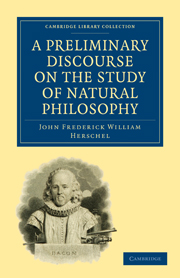Book contents
- Frontmatter
- Contents
- Dedication
- PART I OF THE GENERAL NATURE AND ADVANTAGES OF THE STUDY OF THE PHYSICAL SCIENCES
- PART II OF THE PRINCIPLES ON WHICH PHYSICAL SCIENCE RELIES FOR ITS SUCCESSFUL PROSECUTION, AND THE RULES BY WHICH A SYSTEMATIC EXAMINATION OF NATURE SHOULD BE CONDUCTED, WITH ILLUSTRATIONS OF THEIR INFLUENCE AS EXEMPLIFIED IN THE HISTORY OF ITS PROGRESS
- CHAP. I Of Experience as the Source of our Knowledge. — Of the Dismissal of Prejudices. — Of the Evidence of our Senses
- CHAP. II Of the Analysis of Phenomena
- CHAP. III Of the State of Physical Science in General, previous to the Age of Galileo and Bacon
- CHAP. IV Of the Observation of Facts and the Collection of Instances
- CHAP. V Of the Classification of Natural Objects and Phenomena, and of Nomenclature
- CHAP. VI Of the First Stage of Induction. — The Discovery of Proximate Causes, and Laws of the lowest Degree of Generality, and their Verification
- CHAP. VII Of the higher Degrees of Inductive Generalization, and of the Formation and Verification of Theories
- PART III OF THE SUBDIVISION OF PHYSICS INTO DISTINCT BRANCHES, AND THEIR MUTUAL RELATIONS
- Index
CHAP. VI - Of the First Stage of Induction. — The Discovery of Proximate Causes, and Laws of the lowest Degree of Generality, and their Verification
Published online by Cambridge University Press: 29 August 2010
- Frontmatter
- Contents
- Dedication
- PART I OF THE GENERAL NATURE AND ADVANTAGES OF THE STUDY OF THE PHYSICAL SCIENCES
- PART II OF THE PRINCIPLES ON WHICH PHYSICAL SCIENCE RELIES FOR ITS SUCCESSFUL PROSECUTION, AND THE RULES BY WHICH A SYSTEMATIC EXAMINATION OF NATURE SHOULD BE CONDUCTED, WITH ILLUSTRATIONS OF THEIR INFLUENCE AS EXEMPLIFIED IN THE HISTORY OF ITS PROGRESS
- CHAP. I Of Experience as the Source of our Knowledge. — Of the Dismissal of Prejudices. — Of the Evidence of our Senses
- CHAP. II Of the Analysis of Phenomena
- CHAP. III Of the State of Physical Science in General, previous to the Age of Galileo and Bacon
- CHAP. IV Of the Observation of Facts and the Collection of Instances
- CHAP. V Of the Classification of Natural Objects and Phenomena, and of Nomenclature
- CHAP. VI Of the First Stage of Induction. — The Discovery of Proximate Causes, and Laws of the lowest Degree of Generality, and their Verification
- CHAP. VII Of the higher Degrees of Inductive Generalization, and of the Formation and Verification of Theories
- PART III OF THE SUBDIVISION OF PHYSICS INTO DISTINCT BRANCHES, AND THEIR MUTUAL RELATIONS
- Index
Summary
(137.) The first thing that a philosophic mind considers, when any new phenomenon presents itself, is its explanation, or reference to an immediate producing cause. If that cannot be ascertained, the next is to generalize the phenomenon, and include it, with others analogous to it, in the expression of some law, in the hope that its consideration, in a more advanced state of knowledge, may lead to the discovery of an adequate proximate cause.
(138.) Experience having shown us the manner in which one phenomenon depends on another in a great variety of cases, we find ourselves provided, as science extends, with a continually increasing stock of such antecedent phenomena, or causes (meaning at present merely proximate causes), compentent, under different modifications, to the production of a great multitude of effects, besides those which originally led to a knowledge of them. To such causes Newton has applied the term verœ causeœ; that is, causes recognized as having a real existence in nature, and not being mere hypotheses or figments of the mind. To exemplify the distinction : — The phenomenon of shells found in rocks, at a great height above the sea, has been attributed to several causes. By some it has been ascribed to a plastic virtue in the soil; by some, to fermentation; by some, to the influence of the celestial bodies; by some, to the casual passage of pilgrims with their scallops; by some, to birds feeding on sheel-fish; and by all modern geologists, with one consent, to the life and death of real mollusca at the bottom of the sea, and a subsequent alteration of the relative level of the land and sea.
- Type
- Chapter
- Information
- A Preliminary Discourse on the Study of Natural Philosophy , pp. 144 - 189Publisher: Cambridge University PressPrint publication year: 2009First published in: 1830

